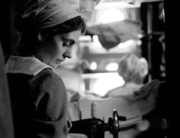Unspoken secrets and untold rage permeate this debut feature from Brooklyn-based, Norwegian-raised filmmaker Mona Fastvold. The writer/director impresses with her shaping of disquieting uncertainty. The only problem is her devotion to keeping most everything unsaid, leaving audiences with more questions left unanswered than is duly warranted.
The director sticks to a subdued palette and a misty atmosphere in her portrayal of the sleepy western Massachusetts countryside. Gitte Witt makes her English-language debut as Kaia, a Norwegian expat who moved stateside to live with her late American father when she was young. She’s now renovating his expansive, airy house with her boyfriend, Andrew (Christopher Abbott, HBO’s Girls).
The couple’s seemingly blissful restoration project is abruptly upended with a late-night phone call from Kaia’s American half-sister, Christine (Stephanie Ellis), an impulsive, unbalanced waif of a woman who lacks any sense of discretion. Though the sisters have not spoken in years (due to an accident allegedly caused by Christine’s recklessness), Christine wants to make it right with her sister and returns unannounced. She reveals to Kaia that not only is she engaged to Ira (co-writer Brady Corbet), a well-to-do UN inspector, but she is carrying his baby.
Fastvold implements a precarious tone with Christine’s arrival. Shots percolate with stalking shadows and breathless dialogue, and this uneasy sense of dread is only deepened with the next day appearance of Ira, arriving to collect his wayward fiancé. Adding to Kaia’s frustration is Christine’s habit of sleepwalking, which leads her down risky wooded paths and compels her to behave inappropriately in front of her sister. As the days dwindle and Christine refuses to return to Boston, the pendulum shifts as the true intentions of these unsteady characters are uncovered.
One of The Sleepwalker’s stand-out scenes takes place at the dinner table. Fastvold shoots the interaction from four angles, each shot fixed on one of the steadily souring characters. After one too many glasses of wine, secrets begin spilling without much prudence or delicacy. We learn that Andrew was a high school dropout who openly admits to assaulting a fellow lacrosse player and that Christine set fire to her father’s garage, resulting in a scar on Kaia’s breast and one reason for her long-standing resentment. Not only is the dialogue deliciously overwrought, but the editing of the scene really shines. Rather than focusing on each one as he or she speak, we are instead treated to unbroken reaction shots of the other three, allowing viewers to feel as though they are actually sitting at the table, absorbing the absurdity of it all.
As the burdened, responsible older sister, Witt portrays Kaia with wavering grace. She wants Christine to find peace, but doesn’t know how to really help her sister. Abbott, sporting a woolly beard and an inflated Bawston accent, steers far and away from the put-upon (and woefully misused) character he played on Girls. He renders Andrew as a gentle giant with a short fuse: Is he a reformed criminal or an insidious snake? But Corbet is the real star here. He portrays Ira with an uncommon gentleness, suggesting an underlying pent-up rage that may not remain stifled for much longer.
Fastvold certainly possesses dexterity for creating an aura of simmering tranquility; hushed whispers and muted hues are heightened by an abiding sense of tacit terror. But while the ambience reliably adheres to the film’s spooky nature, the unsteady narrative leaves much to be desired. Though crucial revelations are offered by the conclusion, we are still left to ponder more than necessary about the implications of the foursome’s actions. Though I can appreciate Fastvold’s trust that her audience does not need to be handheld, for the sake of her viewers, she really ought to have tried harder to shake awake the silent sleepwalker.
















Leave A Comment